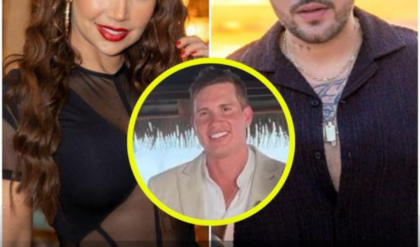The Dark Reality of Hollywood: Corey Feldman’s Courageous Revelations

In recent years, the darker underbelly of Hollywood has been increasingly exposed, revealing a troubling history of exploitation and abuse within the industry. Corey Feldman, a former child actor, has been vocal about the traumatic experiences he and others faced, shedding light on the systemic issues plaguing Hollywood. His story is not just a personal account of survival but a broader indictment of the entertainment industry’s failure to protect its most vulnerable members.
The Big Secret of Hollywood
Corey Feldman has repeatedly stated that the number one problem in Hollywood, both in the past and present, is a deeply rooted culture of silence. In a powerful statement, he asserted, “The number one problem in Hollywood was and is and always will be nobody talks about it. It’s the big secret.” This culture of silence has allowed perpetrators of abuse to remain in positions of power, continuing to exploit young talents with impunity.
Despite the increasing visibility of these issues, many of the individuals responsible for the abuse Feldman and others suffered are still active in the industry. Feldman has been adamant that these figures are some of the richest and most powerful people in Hollywood. His attempts to bring these issues to light have often been met with resistance, highlighting the industry’s reluctance to confront its own dark history.
Hollywood’s Exploitation of Young Talents
Corey Feldman began his acting career at the tender age of three, a time when he could not possibly understand the implications of entering the entertainment industry. Decisions about his career were made by his parents, particularly his mother, who saw the financial potential of his budding career. This early start set the stage for a life marked by exploitation and abuse.
During the peak of his career, Feldman likely earned substantial amounts of money. However, he has alleged that his mother exploited his earnings, a common issue faced by many child stars. The exploitation was not limited to financial abuse; Feldman and his co-star, Corey Haim, endured sexual abuse from powerful men in Hollywood. These traumatic experiences had a lasting impact on Feldman, leading to struggles with substance abuse later in life.
A Courageous Stand Against Abuse
In 2013, Corey Feldman took a significant step by releasing a memoir titled “Coreography,” in which he detailed the abuse he and Haim suffered at the hands of powerful Hollywood figures. According to Feldman, these abuses occurred when they were just 11 to 13 years old. Despite his efforts to speak out, Feldman’s claims often went unheard or were not taken seriously, reflecting a broader societal issue of disbelief and dismissal of abuse survivors.
Feldman’s willingness to reveal the names of those who harmed him and Haim has been met with mixed reactions. While some have supported his efforts, others within the industry have tried to suppress his voice. This resistance is exemplified by an incident involving Barbara Walters, a renowned journalist who appeared to prioritize Hollywood’s reputation over Feldman’s allegations during an interview on “The View.”
The Role of Barbara Walters and Industry Suppression
In an October 2013 episode of “The View,” Corey Feldman discussed his memoir and the abuse he endured. Barbara Walters, known for her probing interviews, delved into Feldman’s experiences but appeared to downplay the severity of his claims. Walters’ approach during the interview sparked backlash, with many viewers criticizing her for seeming to protect the industry’s image rather than addressing Feldman’s serious allegations.
The video clip of this interview gained significant attention online, especially in the context of the #MeToo movement and the growing awareness of abuse in Hollywood. Social media users rallied behind Feldman, demanding an apology from Walters and highlighting the importance of taking abuse allegations seriously.
A Call for Greater Protection and Awareness
Corey Feldman’s revelations have sparked important conversations about the need for greater protection and awareness for child actors in the entertainment industry. His experiences, along with those of other young actors like Brooke Shields, underscore the importance of creating a safer environment for children entering Hollywood.
Legal steps, such as emancipation from parental control and improved working conditions for child actors, have been taken to address these issues. However, there is still much work to be done to ensure the well-being and rights of young performers are safeguarded.
Conclusion
News
Shakira Enfrenta Duras Críticas por un Descuido en su Concierto: ¿Momento Humano o Descuido Imperdonable?
Durante uno de sus últimos conciertos, Shakira, la icónica cantante colombiana, se ha convertido en el centro de una intensa polémica en las redes sociales. Las imágenes captadas en el evento muestran lo que parece ser una mancha de fluido…
📍La lujosa vida🤩 de CARMEN VILLALOBOS💰 que ahora comparte con su nuevo novio🤩
La Lujosa Vida de Carmen Villalobos que Ahora Comparte con su Nuevo Novio Carmen Villalobos, la reconocida actriz colombiana que ha cautivado a audiencias tanto en su país como internacionalmente, ha estado en el centro de atención no solo por…
MULTIMILLONARIO UMAR KAMANI Y REGALO MILLONARIO PARA MILÁN Y SASHA por TRIUNFO DE SHAKIRA
Umar Kamani, Multimillonario, Realiza un Generoso Regalo Millonario a Milán y Sasha por el Triunfo de Shakira En un gesto que ha captado la atención del público y generado numerosos titulares, el multimillonario Umar Kamani ha sorprendido al mundo al…
Carmen Villalobos confirma su embarazo. Esta fue la reacción de Sebastian Caicedo al enterarse.
Carmen Villalobos confirma su embarazo: La reacción de Sebastián Caicedo El mundo del entretenimiento se ha visto sacudido con la reciente noticia de que Carmen Villalobos, reconocida actriz colombiana, ha confirmado estar embarazada. La noticia ha generado un gran revuelo…
Sebastián Caicedo confesó que pensó en “s.u.i.c.i.d.a.r.s.e” por la oscuridad que vivió tras romper con Carmen Villalobos
El actor colombiano cayó en un abismo depresivo: “Se me acabó la vida porque esa era mi vida, tanto profesional como personal” Sebastián Caicedo abrió su corazón recientemente en el programa de televisión colombiano Se dice de mí y habló sobre el difícil…
¿Cómo pudo Dominik rechazar a Liv Morgan? 😮💔 No lo entiendo.
¿Cómo pudo Dominik rechazar a Liv Morgan? Una mirada profunda al mundo del amor y las decisiones personales En el mundo del entretenimiento y la lucha libre profesional, las relaciones personales y románticas entre los luchadores pueden capturar tanto el…
End of content
No more pages to load











